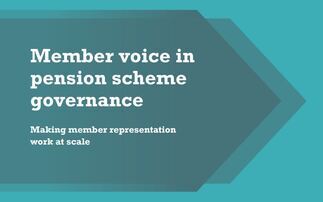
Chris Curry: There are high hopes that the commission will seize this opportunity to address one of the most challenging issues in the UK pension system
This summer finally saw the announcement of the long awaited phase two of the Pensions Review, which has now evolved into a fully-fledged Pensions Commission.
The commission has been warmly welcomed by the pensions industry and wider stakeholder groups and there are high hopes that the commission will seize this opportunity to address one of the most challenging issues in the UK pension system, that of adequacy (or inadequacy) of income in retirement.
Despite this positivity, that doesn't mean that the commission will have an easy job to do, but the fact that they have been given a decent length of time to collect evidence, analyse and then report back gives them more chance of being successful. Additionally, the appointment of the widely respected Baroness Drake, with her first-hand experience of the last Pensions Commission, is also a real positive.
What I also find very reassuring is that as the Pensions Review grew into the commission, the scope is also wider than was originally floated last year. In particular, it is very good to see the focus on both fairness and sustainability – the three key indicators of the health of a pension system that we at the Pensions Policy Institute (PPI) use as the basis for our annual UK Pension Framework report. Fairness can be a very difficult concept to articulate and can mean different things to different people. However, if it means that any potential reform proposals take into account the impact on the groups that currently do less well from the UK pension system, that has to be a good thing.
Working together
It was these groups that were the focus of discussion of a recent roundtable that the PPI held for its supporters last month – an opportunity to meet one of the commissioners. As well as offering suggestions as to how the commission might best work with the pensions industry, the discussion mainly focused on gaps – both in the current evidence base, and also where retirement income adequacy was likely to be lowest.
This ranged from the self-employed and women and also highlighted the varying outcomes for different ethnic groups, those with disabilities and carers. There is also of course the intersectionality that means that some people face multiple disadvantages.
Obviously, there is a distinct link between poorer pension outcomes for these groups and poorer labour market experience and earnings. While we have to be very careful not to try and use the pension system to "fix" much broader issues such as low earnings, health inequality and housing market issues, the system should not exacerbate these issues either.
It's also how you get there
Though, perhaps the greatest challenge for the commission is not in determining what the pension system should look like in future, but how to get there. There are many different practicalities to be considered, and often it is these details that can determine the success or failure of policy, or even if it ever comes in to force.
One of the major learnings for me from the introduction of automatic enrolment (AE) is that major changes can be made to systems if they are well planned and communicated and introduced over time. The initial roll out across employers and the introduction of minimum contributions were both done over a number of years. Even when there were economic difficulties, it was possible to push the timetable back and so retain a degree of flexibility. Nonetheless, it allowed everyone involved time to adjust.
The changes were also scheduled to be introduced at times at which they were most likely to be successful – so minimum contributions were increased at times at which other changes, such as tax and national insurance levels, were also being made so the change was less likely to be perceived as negative.
Contrast this with the 2017 AE review recommendations, which were only given a target of the "mid 2020s" for implementation and are yet to be enacted, despite having broad support across the political spectrum. The practicalities matter. Implementation matters.
With this in mind, as well as encouraging the commission to think broadly and boldly, and to consider how pensions work for everyone, I would also add to that list to think about how we get to where the commission would like us to be from here. Sometimes the road you travel is just as important as the destination.
Chris Curry is director of the PPI and principal of the Pensions Dashboards Programme.








